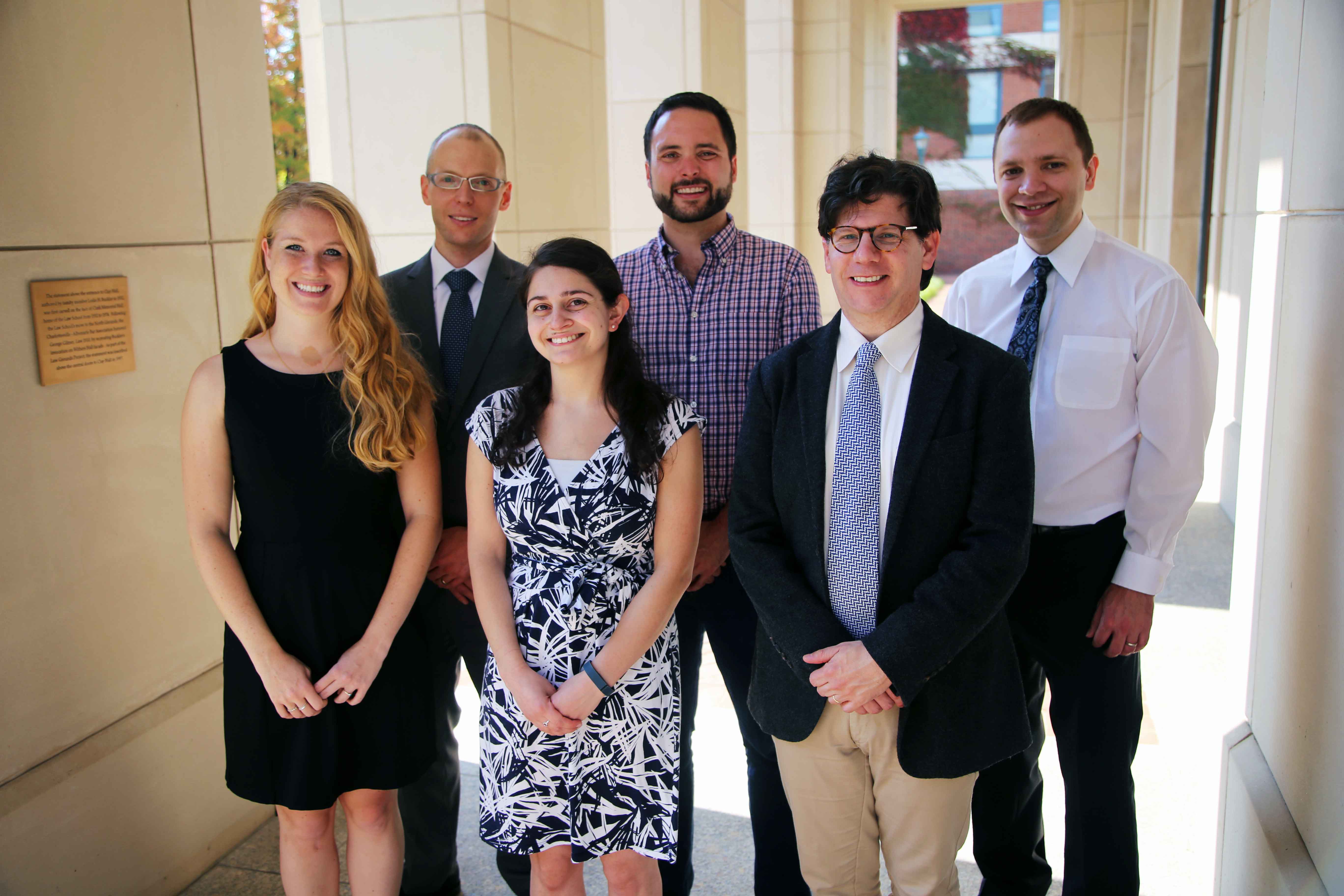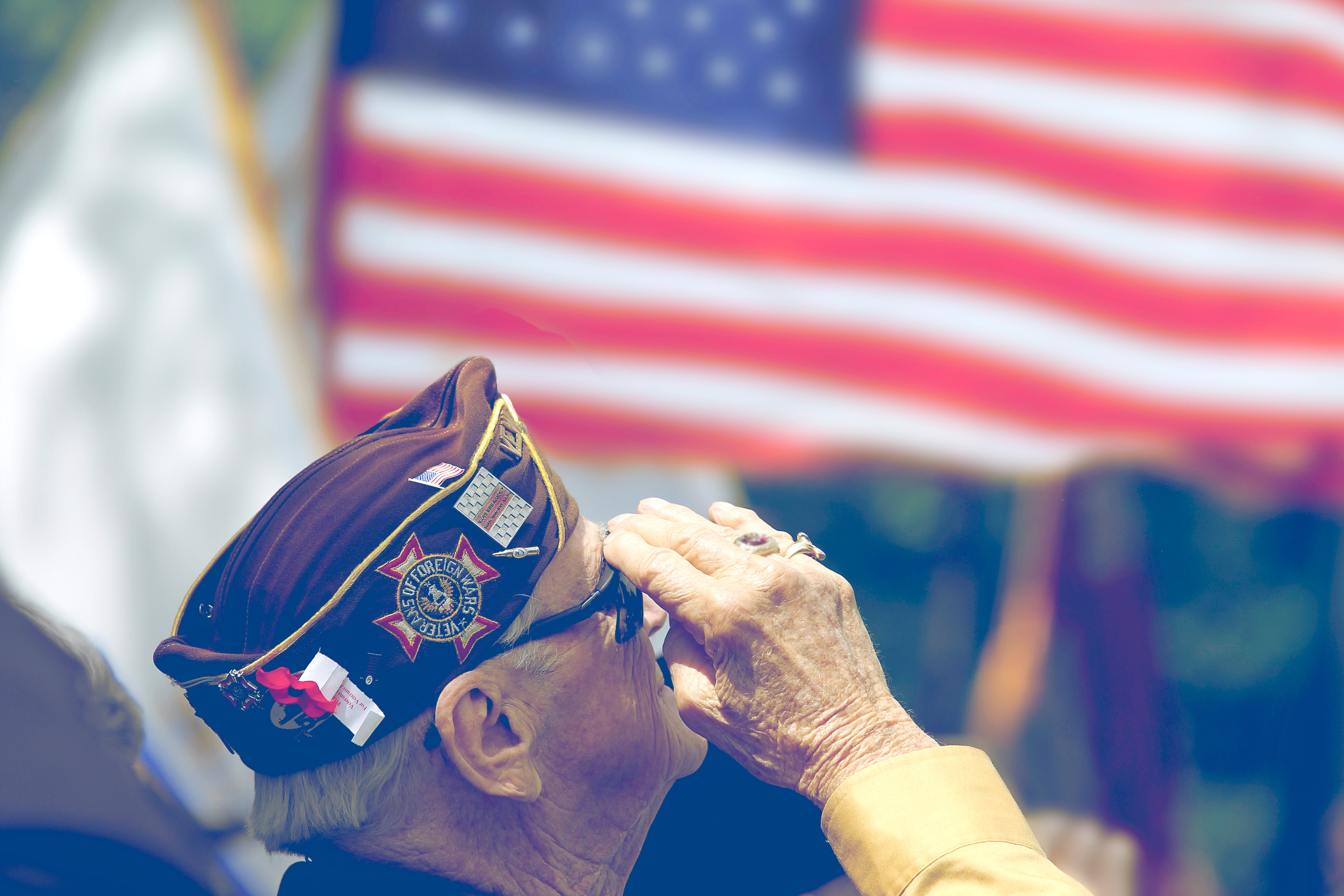A team of University of Virginia School of Law students and local attorneys is building a record of success in advocating for veterans pursuing disability claims.
The pro bono effort, under the direction of local attorneys K. Jay Galloway (a 2015 Law School graduate) and Dan Krasnegor, helps veterans navigate the complex process of appealing disability claims denied by the Department of Veterans Affairs.
In the past three years, the volunteers have successfully appealed each of the seven cases they’ve taken to the U.S. Court of Appeals for Veterans Claims, and also have handled several claims in the administrative agency process before they go to court? The project has close ties to the law student organization Advocates for Disabled Veterans.

K. Jay Galloway, second from left, and Dan Krasnegor, second from right, are helping a group of students gain practical experience and help disabled veterans. (Photo by Kimberly Reich, School of Law)
“The law isn’t sterile. It’s easy to forget when reading cases for ‘Administrative Law’ or ‘Civil Procedure’ classes that sometimes, or often, real individuals’ futures or reputations are at stake in any given legal matter,” said second-year law student Michael Goudey, a student volunteer. “If I can help a client obtain a positive ruling in a case, there’s a chance that the health care, education or other benefits that the veteran receives could change his or her life.”
Students working on the project screen and evaluate the merits of claims to help determine which cases the group can take. They also draft briefs and motions in federal court, draft settlement memoranda, conduct research on legal and medical problems to assist expert witnesses, develop case strategies, analyze policy proposals and organize public events. The work gives students experience in handling real legal problems.
“The project is perfect for pro bono because it touches so many areas of law. The skills students learn from this work can translate to other fields,” Galloway said. “The project also helps to raise awareness of veterans’ disability claims work. There are many attorneys who don’t know that this work exists. It is my hope that our volunteers will go on to their careers and be able to reach back and volunteer in this area.”
Galloway, who has a trusts and estates practice at the Charlottesville law firm Morin & Barkley, began helping veterans while still in law school. Professor Thomas Nachbar, a judge advocate in the U.S. Army Reserve, and other attorneys willing to sponsor the group’s work advised him along the way.
Krasnegor, whose practice at the Charlottesville office of Goodman, Allen & Filetti is focused on helping disabled veterans, advises students and leads roundtable discussions of legal issues with the volunteers.
The group fills a gap in service to veterans by working on cases private practitioners are unlikely to pursue, Galloway said. Attorneys typically take these types of claims on a contingent-fee basis and collect a portion of the earned-but-unpaid benefits in successful cases. However, some claims award veterans medical benefits and only a small amount of money. Because private attorneys can’t afford to take on all such cases, some veterans have few options for legal assistance.
“Attorneys also can’t represent for a fee until after a veteran is denied, so a great many initial applications that are filed are destined to fail, which creates a backlog of appeals,” Galloway said.
Richard Keith Crosby, a retired Marine Corps sniper, is one of the veterans the group is currently assisting. His claim involves exposure to contaminated water at Camp Lejeune in North Carolina.
“Jay and the law students at UVA provide critical support to veterans in need,” Crosby said. “Their work on my claim has been exceptional and the expert opinion they assisted my neurologist to develop has already been useful in assisting other veterans in the local community whose physicians wanted to help, but didn’t know how.”
Media Contact
Article Information
November 3, 2016
/content/law-school-volunteers-fight-behalf-wounded-warriors

